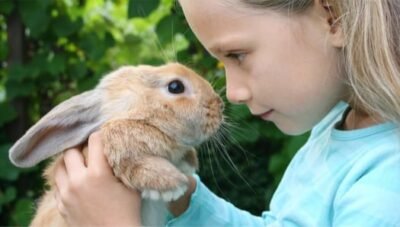What Are The Pros And Cons of Indoor Rabbits As Pets?

Rabbits are increasingly popular as indoor pets. They are relatively low-maintenance, can be litter box trained, and have gentle dispositions. However, there are also some drawbacks to keeping rabbits indoors.
They require a lot of exercise and may chew on household items if not properly trained. Here is a more detailed look at the pros and cons of indoor rabbits as pets.
There are many pros and cons to indoor rabbits as pets. Some people love them for their cute and cuddly nature, while others find them to be a nuisance. Here are some of the most common pros and cons of indoor rabbits:
Pros:
-They make great companions and can form strong bonds with their owners.
-They are relatively low maintenance compared to other pets such as dogs or cats.
-They are quiet and clean animals that won’t make too much of a mess in your home.
-They have a long lifespan, so you can enjoy their company for many years to come!
Cons:
-Rabbits require a lot of exercise, so they may not be suitable if you live in a small home or apartment where they wouldn’t have enough space to run around.
-They also have very specific dietary requirements which can be tricky to meet if you’re not familiar with them.
-If not socialized properly, rabbits can become skittish around people and may bite or scratch if they feel threatened.

Credit: www.pinterest.com
Are Rabbits Good Indoor Pets?
Rabbits can make excellent indoor pets, provided their needs are met. They require a spacious cage or enclosure, plenty of fresh hay and vegetables, daily exercise and regular grooming. When properly cared for, rabbits can live 10-12 years.
Do Rabbits Smell in the House?
Rabbits are often thought of as being clean animals, but do they really live up to this reputation? Do rabbits smell in the house?
The simple answer is yes, rabbits can smell in the house.
However, it is important to understand that there are a number of factors that will influence how strong their scent is. For example, diet and health can play a role in how much a rabbit smells. Additionally, the type of cage and bedding material can also affect odor.
That being said, there are some things that you can do to help minimize the amount of odor that your rabbit produces. First, make sure that their diet includes plenty of hay. Hay is an important part of a rabbit’s diet and helps with digestion which can reduce odor.
Secondly, you’ll want to change their bedding regularly and use materials that don’t retain odors (such as pine shavings). Finally, keep their cage clean and free from waste to further reduce any potential smells.
Is It Better for a Rabbit to Be Indoors Or Outdoors?
This is a difficult question to answer as there are pros and cons to both indoor and outdoor living for rabbits. Ultimately, the decision of whether to keep your rabbit indoors or outdoors depends on a variety of factors, including your personal preference, the climate you live in, and the amount of space you have available.
Some people believe that rabbits are happier and healthier when they live outdoors because they have more space to run around and explore.
However, it is important to remember that rabbits are prey animals, which means they are constantly at risk of being attacked by predators such as dogs, cats, foxes, and birds of prey. If you live in an area with a lot of these predators, it is probably not safe to let your rabbit roam free outside. Additionally, even if you don’t have predators in your area, rabbits can still be injured or killed if they escape from their enclosure and get hit by a car or eaten by another animal.
Another consideration is the climate you live in. If you live in an area with very hot summers or very cold winters, it may not be suitable for your rabbit to live outdoors year-round. In these cases, it’s best to provide your rabbit with a spacious indoor enclosure where they can enjoy the comfort of temperature control.
Finally, it’s important to think about the amount of space you have available for your rabbit. If you only have a small backyard or patio, chances are your rabbit will become bored quickly if left alone out there all day with nothing to do. On the other hand, if you have plenty of space for them to run around and explore (including some safe places for them to hide), then outdoor living might be ideal for your bunny friend.
PROS & CONS OF HAVING A RABBIT!
Disadvantages of Having a Rabbit As a Pet
Rabbits are often thought of as low-maintenance pets, but there are some disadvantages to having a rabbit as a pet. One disadvantage is that rabbits require a lot of exercise. They need to be able to run and jump, and they need space to do this.
If you don’t have a large enough space for your rabbit to exercise, they can become overweight and unhealthy.Another disadvantage of owning a rabbit is that they can be difficult to potty train. Rabbits like to urinate and defecate in the same spot, so you’ll need to provide them with a litter box or make sure their cage is big enough for them to have a designated “bathroom” area. Rabbits also like to chew on things, so you’ll need to keep an eye on them if you don’t want them destroying your furniture or other household items.Overall, rabbits can make great pets but it’s important to be aware of the potential disadvantages before getting one.
If you’re prepared for the challenges of owning a rabbit, then you’ll likely have many years of enjoyment with your furry friend!
Advantages And Disadvantages of Having a Rabbit As a Pet
Rabbits are popular pets for a reason: they’re gentle, playful, and relatively low-maintenance. But like any pet, there are pros and cons to owning a rabbit. Here’s what you need to know before deciding if a rabbit is the right pet for you.
Advantages of Rabbits as Pets
Rabbits make great companions for several reasons. First, rabbits are social creatures that enjoy human interaction.
They can be trained to do tricks and will even come when called by name. Second, rabbits are relatively quiet pets – they don’t bark or meow like other common household pets. And third, rabbits are clean animals; they groom themselves regularly and use a litter box without issue.
Another advantage of owning a rabbit is that they don’t require much space. A single rabbit can live happily in an apartment or small home as long as he has access to a few key things: a spacious cage or hutch (for sleeping and hiding), plenty of toys and chewable objects (to keep him entertained), and regular exercise outside of his cage (to prevent boredom and destructive chewing).
Disadvantages of Rabbits as Pets
Of course, no pet is perfect – even the beloved bunny has some drawbacks. One downside of ownership is that rabbits have delicate digestive systems; their diet must be carefully monitored to avoid gastrointestinal issues such as gas, bloating, diarrhea,and constipation . This means no table scraps or unsupervised grazing on your lawn!
Pros And Cons of Owning a Dwarf Bunny
There are many factors to consider before deciding whether or not to get a dwarf bunny. Here are some pros and cons of owning a dwarf bunny to help you make your decision:
Pros:
-Dwarf bunnies are extremely adorable and make great pets.
-They have relatively low maintenance needs compared to other pets, such as dogs and cats.
-Dwarf bunnies typically live for about 8-10 years, so they can provide years of companionship.
-They are also fairly easy to litter train.
Cons:
-Dwarf bunnies require more frequent vet checkups than larger breeds due to their smaller size and delicate health.
-They are also more susceptible to health problems such as dental issues, respiratory infections, and heat stroke.
-Dwarf bunnies need a lot of exercise, so they may not be the best pet for someone with a busy lifestyle.
Rabbit at Home Good Or Bad
Rabbits are often thought of as low-maintenance pets, but there’s actually a lot of care that goes into keeping a rabbit healthy and happy. Before you bring a rabbit home, it’s important to do your research to make sure that they are the right pet for you and your lifestyle.
One of the most important things to consider is whether or not you have enough space for a rabbit.
They need plenty of room to run and exercise, and their cages should be large enough that they can stretch out fully without being cramped. If you live in an apartment or small house, a rabbit may not be the best fit.
Another thing to keep in mind is that rabbits are social creatures and need companionship.
If you’re gone all day or frequently travel for work, a rabbit may not be the ideal pet. They’ll likely get lonely and depressed if left alone for too long.
If you think a rabbit might be the right pet for you, the next step is to find a reputable breeder or adoption agency.
Once you’ve brought your new furry friend home, there are some basic supplies you’ll need like food, hay, water bottle, litter box, and toys. And don’t forget about regular vet check-ups!
Are There Any Differences in the Pros and Cons Between Male and Female Rabbits as Pets?
When considering male and female rabbits as pets, it’s essential to be aware of the pros and cons of rabbit genders. Male rabbits, known as bucks, tend to be more territorial and may display aggression towards other rabbits. Female rabbits, or does, need to be spayed to prevent reproductive issues. Understanding these gender-specific traits can help potential rabbit owners make informed decisions.
Conclusion
Rabbits are often thought of as low-maintenance pets, but there are both pros and cons to owning an indoor rabbit. On the plus side, rabbits are quiet, gentle, and can be litter box trained. They also have a relatively long lifespan for a small pet, averaging 8-12 years.
However, rabbits also require a lot of exercise and need plenty of space to run around. They also tend to chews on things (including electrical cords), which can pose a safety hazard. Overall, indoor rabbits make great pets for those who are prepared to provide them with the care they need.
